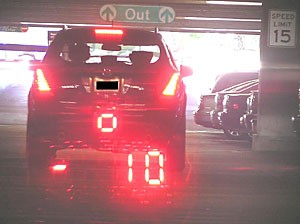After issuing 181 warnings to campus drivers, a new system to catch traffic violations in UA parking garages was supposed to start handing out citations last week, a Parking and Transportation Services official said.
But since Oct. 2, when the official citations began, no drivers have been cited, said Patrick Kass, director of PTS.
While Kass said he hopes he will never have to issue a citation, experience tells him that probably will not happen.
The purpose of the six-week “”education period”” at the beginning of the semester was to let drivers get used to a new 15 mph speed limit and elevated supervision in the garages, Kass said.
“”We really wanted people to understand what we were doing and why we were doing it,”” Kass said.
Courtney Wells, a pre-nursing sophomore, said she had not heard of stricter regulations in the garages but they probably won’t make much difference in how people drive.
People will drive the way they want to, and new enforcement measures might just make for more angry students, Wells said.
To catch speeders, PTS is using a new photo-laser device.
PTS has only one of the photo-laser monitors, Kass said, but it is hand-held and portable. That makes it easier and cheaper to find speeders in all seven of the garages on campus, he said.
Kelsey Schlecht, an undeclared sophomore, said she doesn’t think anyone can go much faster than the 15 mph speed limit.
But Kass said that belief is a mistake, as there are records of drivers going as fast as 27 mph in the parking garages.
Matt Kinnaman, an electrical engineering sophomore, said he knows speeding is a problem in parking structures.
If drivers go more than 5 mph faster than the speed limit, they should get a citation, Kinnaman said.
But Kass said the 15 mph speed limit is strictly enforced, and even driving at 16 mph will land students with a $50 fine if the camera catches them.
Revenues from citations account for 8 percent of the PTS budget, Kass said.
Kass said tighter regulations in the garages are not meant to generate money. In fact, Kass said he doesn’t expect money from tickets to cover what was spent to enforce the regulations.
But if PTS does find itself in a tight spot financially, they might raise the fines on violations, Kass said. The agency does not have any expectations as to how much it will make from the citations.
“”We do not set goals, with the exception of trying to enforce (the rules) as consistently as we can,”” Kass said.
Tickets from PTS are issued directly from the department, which is not a state agency, and so violations do not go on the driver’s record.
After a driver is cited in the parking garages, he still has the option to appeal the ticket.
However, if the driver does not appeal or pay the fine, his car might be impounded if he parks anywhere on campus.
PTS officers will enforce other regulations in person, like driving the correct way down one-way lanes in garages.









